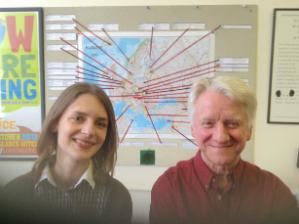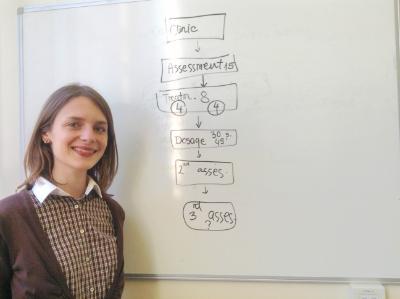Blogs
My STSM Experience: Ana Matić

My experiences in Short Term Scientific Mission within COST Action IS1406
STSM: Speech and Language Services in Croatia and the UK
My name is Ana Matić and I am from Zagreb, Croatia. I have a Master’s in Speech and Language Pathology and I currently work in the Laboratory for Psycholinguistic Research at the Department of Speech and Language Pathology at the University of Zagreb.
As my wonderful Professor Jelena Kuvač Kraljevic is passionately involved in this COST Action which includes over 34 countries across Europe and 3 international partner countries, she encouraged me to come and visit Professor James Law here at Newcastle University in order to share experiences and broaden my knowledge.
I must admit at first I was slightly worried about how I will represent our Laboratory and all the work we do. Words scientific and mission in the 4-word title of my visit did not help; you can probably imagine why. Nevertheless, my worries did not last long as I immediately fell in love with the University and all the academic staff which was more than welcoming and pleased to help in every way.

As this COST Action has an aim of enhancing the science in the field, improving the effectiveness of services for children with language impairment (LI) and developing a sustainable network of researchers, I was motivated to present the Croatian contribution on the matter. We all know that there are many services that are being delivered to children with LI out of which some do not meet the preferred criteria of being proven effective and cost-effective.
Having that in mind, within the EU project Prerequisites for academic equality: early recognition of language disorders awarded to the Department of Speech and Language Pathology, University of Zagreb (head: Jelena Kuvač Kraljevic, PhD) we developed a Group and Indirect Language Therapy Programme aimed at fostering early literacy in preschool children with LI. It was a carefully designed programme based on the latest empirical findings in the area which involved two groups of four children and also their parents.
The programme lasted for 30 sessions, each 45 minutes in duration and covered all the early literacy abilities that form a basis for later development of reading and writing. The programme was indirect in the sense that parents were also actively involved: they watched the group sessions through the one-way mirror, they were educated on the importance of early literacy and given advices on how to help fostering the targeted abilities in the home environment.
The pre- and post- comparison of the children’s results achieved on tests measuring literacy and language, as well as the parental responses on the questionnaire given to them in order to gain insight on their thoughts on the therapy provided, led us to the assumption that this programme might indeed be effective. Of course, we should not rush and make final conclusions as there are some obvious disadvantages of the study (e.g., lack of the control group and a rather small cohort), but this is definitely something to be investigated further.

I have to say I am very thankful for being given the opportunity which does not happen that often – to present these findings to the lovely academic audience of Newcastle University. They all gave me stunning ideas and motivated me to explore this further. My one week experience here was informative and enlightening in every way and I will most certainly come back.
I want to seize this opportunity to thank my Professor Jelena Kuvač Kraljevic for always having brilliant and clear visions and pushing me forward, Professor James Law for welcoming me, giving me numerous useful advices and making me a part of the COST Action, and also Frances Hardcastle for so patiently answering all my questions and making this experience run incredibly smoothly.
Best to all,
Ana
Last modified: Wed, 22 Mar 2017 14:56:05 GMT



